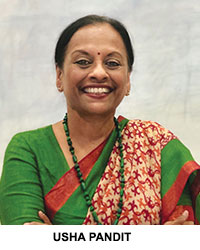 – Usha Pandit is the CEO of Mindsprings, educational consultant, teacher trainer, expert in gifted education, and author
– Usha Pandit is the CEO of Mindsprings, educational consultant, teacher trainer, expert in gifted education, and author
If India’s education policy formulators take a few leaves from prominent educators, we would have a clear roadmap to re-evaluate and solve the nation’s chronic education deficit. From Piaget’s Constructivism schema, they could learn how children connect with prior knowledge, and learn by doing. From Dr. Maria Montessori, they can learn about how children learn independently and Vygotsky’s zonal proximal development scaffolding would advise them that syllabuses and curriculums should inspire children to undertake tasks that stretch their capabilities. Educators also need to be aware of Skinner’s behaviourism which posits that if children are praised, they change their behaviour for the better. Moreover, Dr. Howard Gardner has demonstrated that all children are endowed with multiple intelligences that educators should identify and nurture.
There are four distinct stages of physical, cognitive, emotional and social development in children between the ages of 0-2; 3-7; 8-11 and 12-16. At 0-2, the child already has one language — her mother tongue — learnt in the home environment. At this stage, the brain is completely ready for spoken languages and that’s why we should focus on developing oral skills. At 3-7, when a child enters pre-primary school, she is in her element — curious, playful, keen, imaginative and creative. Research indicates she has capability to learn five-ten new words every day. If taught through play, fundamental math, experiential and sight-reading become enjoyable and are learnt easily.
In upper primary school (age eight-11), children need to develop core learning skills taught through a variety of hands-on activities, stories, games, print and digital inputs. In high school (age 12-16), students should develop critical thinking and problem-solving skills to validate theory, transform into autonomous learners, do teamwork, experience internships, become socially aware and engage in reflection. At all stages, teachers should appreciate differentiation and celebrate the diversity of potential in children.
The foundation years are critical. They lay the cornerstones of all future learning. Hence, early childhood care and education (ECCE), accorded insufficient official attention, needs to be given high importance to build cognitive and social capital, as belatedly recommended in the National Education Policy 2019 draft of the Dr K. Kasturirangan Committee.
What children don’t enjoy in the first two stages (0-7) is mechanical, overly technical education. Forcing children to engage in repetitive reading and writing numbers and alphabets, rudderless word study, and over-focus on the nuances of phonics, is not conducive to their cognitive development. Regimented classes that offer little free play and low sensory inputs in the form of pictures, materials and other resources can stunt youngest children’s minds and implant early disinterest and dislike of academics.
Nature shows us there are clear stages in the growth of all organisms that require timely interventions to stimulate development. A young plant or animal has a natural growth trajectory that goads it towards becoming a successful tree or adult. The natural trajectory of young homo sapiens is similar. Understanding of age-compatible cognitive development curriculums and processes is required in contemporary education. Unfortunately, the overwhelming majority of board syllabuses and school curriculums are not age-appropriate.
Effective teaching is essentially dependent upon using pedagogy intelligently by providing age and interests sensitive materials to elicit responses that match peer shared and teacher-guided capability. For instance, a picture can be used to generate ideas, anchor thoughts and prompt observations to stimulate discussion. A story can become an invitation to think laterally. A game can be used to practice language learning. Action can enhance kinesthetic awareness, art can be used for geometry and to strengthen fine-motor muscles required for handwriting,
an enacted song can be used to teach geography and poetry can spark humour.
With tiny learners, educators need to concentrate on encouraging joyful participation instead of doling out small, measured, syllabus portions that are obsessively tested. The irony is that as testified by the Pratham Education Foundation’s Annual Status of Education reports, over 50 percent of class V children cannot read and write class II textbooks. This unfortunately is the outcome of forcing agein appropriate learning upon children in pre-primary and early years education.
The draft National Education Policy 2019, now receiving final touches in the Union HRD ministry, has accorded high importance to early childhood care and education to prepare youngest children for imminent challenges of the 21st century. Teachers need to jettison the colonial practice of making children merely literate. Children need to be prepared to become thinkers, collaborators, creators of new knowledge and problem solvers from the earliest years. They need to learn to live in the age of artificial intelligence — the house of tomorrow that we may never visit. As teachers, we need to find the will to prepare them for this new age today.


























